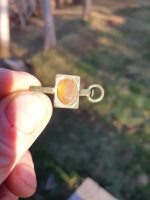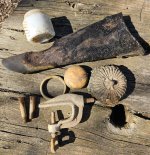Hello everyone, especially those in North Carolina. this is my first entry, 2nd night surfing treasure Net. I have a story to tell that I believe is as true as can be. I was a friend of an elderly man near my home. He owned two grist mills. I used to go sit on the porch and listen to him talk. He was a sailor and explorer from Scotland. He even used to treasure hunt in his youth in the Bahamas. He would never let me tape-record him so I respected that and just listened to his tales.
The best treasure tale he told was about three bronze cannons that were abandoned by General Cornwallis during the American Revolution. My friend told me there was a payload of gold that was to be used to pay British troops. As I was told, Lord Cornwallis stashed the payroll and cannons in a large ravine somewhere between Greensboro and Wilmington. Cornwallis planned to recover the payroll and cannon later as he was in a hurry and needed to continue his campaign. Cornwallis apparently never returned to Wilmington but instead headed north to be defeated by Washington in the final months of the war.
My North Carolina friends will know that is a very huge territory to try and cover. My friend told me that the gold was recovered in the late 1800's but not the cannons, as the ravine became swampy, the cannon were forgotten about. The man told me the cannon are still there, but now under water where a small lake was eventually formed. I begged my friend to tell me where the lake was. He said I could never get the cannons out as it was on private land and that the lake is full of moccasin snakes and still very swampy. He said the lake was closest to Wilmington.
My friend is now deceased as is his wife. The very last time he talked about it, he made the comment: " those cannons, being bronze and historically significant would be worth well over $300,000.00 My friend took the location with him to his grave. Seems to me, anyone living near Wilmington that has access to historical routes/maps could do a topographical overlay and look at current areas of water or swamp, maybe if narrowed down, with the permission of the possible land owner, one could hire a scuba diver to locate the cannons, then have a tow truck winch them out.
I hope someone finds this site, good luck! Maybe I will hear about it in the paper one day.
David in NC.
The best treasure tale he told was about three bronze cannons that were abandoned by General Cornwallis during the American Revolution. My friend told me there was a payload of gold that was to be used to pay British troops. As I was told, Lord Cornwallis stashed the payroll and cannons in a large ravine somewhere between Greensboro and Wilmington. Cornwallis planned to recover the payroll and cannon later as he was in a hurry and needed to continue his campaign. Cornwallis apparently never returned to Wilmington but instead headed north to be defeated by Washington in the final months of the war.
My North Carolina friends will know that is a very huge territory to try and cover. My friend told me that the gold was recovered in the late 1800's but not the cannons, as the ravine became swampy, the cannon were forgotten about. The man told me the cannon are still there, but now under water where a small lake was eventually formed. I begged my friend to tell me where the lake was. He said I could never get the cannons out as it was on private land and that the lake is full of moccasin snakes and still very swampy. He said the lake was closest to Wilmington.
My friend is now deceased as is his wife. The very last time he talked about it, he made the comment: " those cannons, being bronze and historically significant would be worth well over $300,000.00 My friend took the location with him to his grave. Seems to me, anyone living near Wilmington that has access to historical routes/maps could do a topographical overlay and look at current areas of water or swamp, maybe if narrowed down, with the permission of the possible land owner, one could hire a scuba diver to locate the cannons, then have a tow truck winch them out.
I hope someone finds this site, good luck! Maybe I will hear about it in the paper one day.
David in NC.





